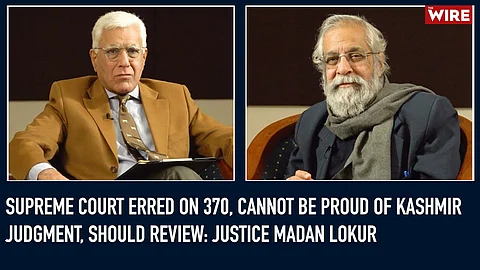

JAMMU: Former Supreme Court judge Madan Lokur has said that the top court has erred and cannot be proud of its Article 370 judgement but, instead, should review it.
Justice Madan Lokur also described the Supreme Court judgement as complex and complicated adding it’s at least 200 pages too long, The Wire reported.
(Photo: Courtesy The Wire)
In his analysis, he pointed out inconsistencies in the judgement and agreed the logic was, at times, if not often, ‘convoluted’.
In a 40-minute interview to Karan Thapar for The Wire, Justice Lokur made clear that he was “unhappy” with the way the Supreme Court has upheld what is popularly called the abrogation of Article 370 and “even more unhappy” with the way the Supreme Court refused to determine whether the re-organisation of Jammu and Kashmir was constitutionally permissible under Article 3.
Speaking about the Supreme Court’s refusal to determine whether the re-organisation of Jammu and Kashmir was constitutionally proper, Justice Lokur said the Supreme Court had failed to fulfill its duty to look into this matter.
He said it was an “error” not to decide the constitutionality of this matter.
Justice Lokur made clear that after the Supreme Court had declared the use of Article 367 to interpret constituent assembly as legislative assembly as ultra vires it should have proceeded to strike down the abrogation of Article 370, which was done on the basis of that reinterpretation.
Not to do so was inconsistent with the logic of the Supreme Court’s own argument, he averred.
Speaking about the Supreme Court’s refusal to determine whether the re-organisation of Jammu and Kashmir was constitutionally proper, Justice Lokur said the Supreme Court had failed to fulfill its duty to look into this matter. He said it was an “error” not to decide the constitutionality of this matter.
Justice Lokur said one of the consequences of the Supreme Court failing to determine the constitutionality of the re-organisation of J&K is that a precedent has been set which can be used, if the government should so wish, to re-organise other states, such as Bengal, Kerala and Tamil Nadu, and reduce them to union territory status.
Justice Lokur stated that another significant consequence is the impact on India’s federalism, which the Supreme Court has previously deemed to be part of the basic structure of the constitution. “That means federalism cannot be amended. But now the Supreme Court has given Parliament the power to re-organize a state, even without any recommendation from the state assembly. There could thus be a potential clash between the power of Parliament and the sanctity of the basic structure of the constitution,” Justice Lokur said.
The full interview can be watched here.
—–
Have you liked the news article?